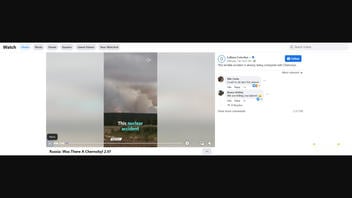
Was an explosion of a nuclear-powered missile that took place near the Russian village of Nyonoksa comparable to the Chernobyl nuclear accident of 1986? No, that's not true: Although the Nyonoksa incident did involve fatalities, there is no evidence to suggest it caused as widespread an impact as the Chernobyl incident. Additionally, a post with footage of the Nyonoksa incident does not clarify that it occurred in 2019 and that it was not a result of the ongoing Russia-Ukraine conflict.
The claim appeared in a Facebook post (archived here) on February 7, 2022, of a video detailing the explosion and aftermath of the Nyonoksa incident. The video was titled "Russia: Was There A Chernobyl 2.0?" The caption of the video reads:
This terrible accident is already being compared with Chernobyl.
This is what the post looked like on Facebook on February 23, 2022:
(Source: Facebook screenshot taken on Wed Feb 23 18:20:20 2022 UTC)
The explosion during the Nyonoksa incident resulted from an operation to recover a nuclear-powered missile. There were five fatalities and a few known injuries. There were reports of radioactive material in the area after the explosion. Residents of Nyonoksa -- which closed its access to outsiders after the incident -- have expressed concern about the aftermath of the incident. However, Russian officials only advised residents to leave the area for a short time a few days after the incident, not for an extended time.
In contrast, the nuclear accident at the Chernobyl Power Plant in Ukraine was caused by a malfunctioning reactor that spread radiation in the atmosphere. It resulted in the immediate death of two workers, dozens of deaths in the months afterward and was linked to at least 1,800 cases of thyroid cancer in children who were exposed to the radiation. Tens of thousands of people were evacuated from areas surrounding the power plant, and those areas are still experiencing the effects at the time of writing.
There is no indication that there was as much of a health or environmental impact following the Nyonoksa incident as there was after the Chernobyl incident. Lead Stories could not locate any information directly from the International Atomic Energy Agency (IAEA) and Nuclear Energy Agency (NEA) about the Nyonoksa incident. However, the IAEA classified the Chernobyl incident as a "Major Accident" or a "7" on its International Nuclear and Radiological Event Scale, the highest rating on the scale.
The Facebook post was published in the midst of an ongoing conflict between Russia and Ukraine, and at the time of writing Russian troops received authorization to cross Ukraine's border. The post does not include any context explaining that the Nyonoksa incident predates the ongoing Russia-Ukraine conflict by more than two years.
Lead Stories reached out to the IAEA and the NEA. We will update this story with any relevant responses.



















